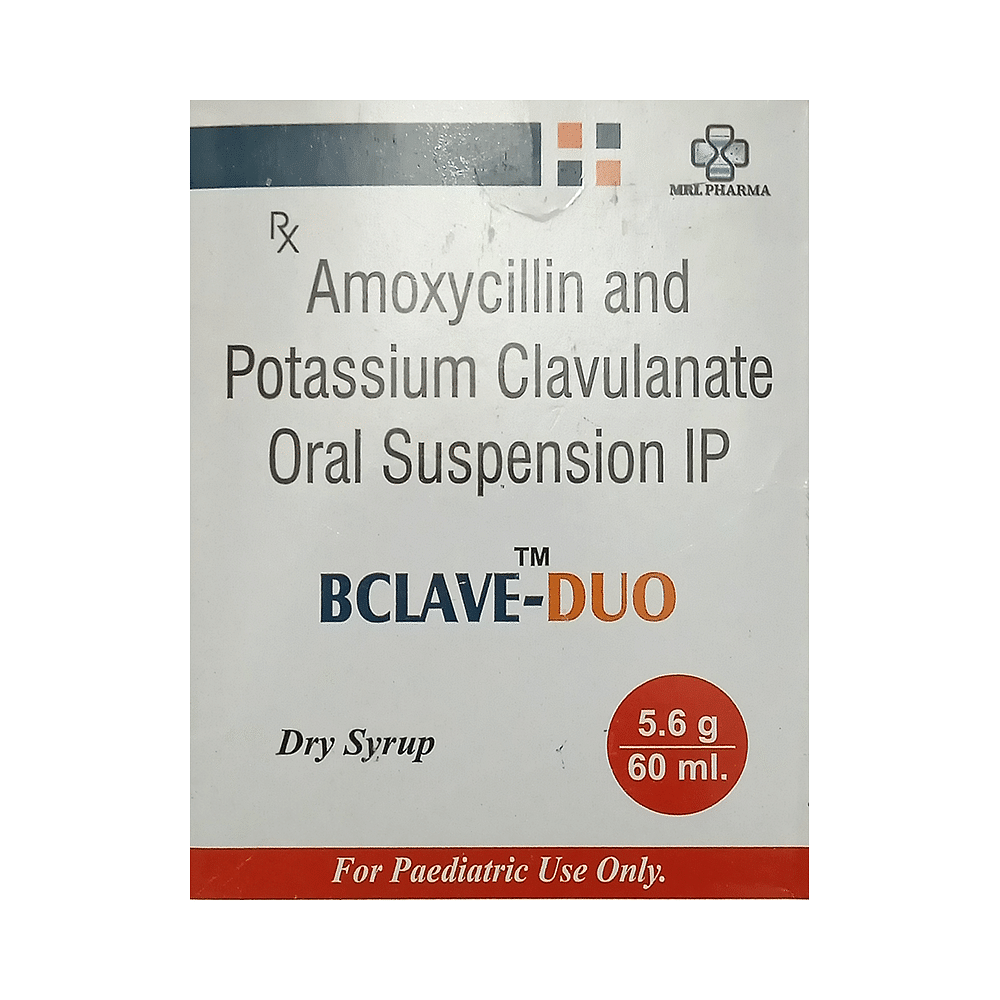
Aediclav Dry Syrup
Manufacturer
Aadi Health Care
Salt Composition
Amoxycillin (200mg/5ml) + Clavulanic Acid (28.5mg/5ml)
Key Information
Short Description
Aediclav Dry Syrup is an antibiotic used to treat bacterial infections in various parts of the body, including the ear, nose, throat, chest, lungs, teeth, skin, and urinary tract.
Dosage Form
Oral Suspension
Introduction
Aediclav Dry Syrup is an antibiotic medicine designed to combat bacterial infections in multiple areas such as the ear, nose, throat, chest, lungs, teeth, skin, and urinary tract. It is particularly effective against bacteria that have developed resistance to other treatments, making it a valuable option for treating resistant tuberculosis. The medication contains two active ingredients, amoxycillin and clavulanic acid, which work together to inhibit bacterial growth and survival. While generally safe, it is important to complete the full course of treatment to prevent the recurrence of infection and resistance. Always consult a healthcare provider before starting or sharing this medication.
Directions for Use
Administer the prescribed dose of Aediclav Dry Syrup to your child as directed by the doctor. Ensure the full course is completed even if symptoms improve.
How it works
Aediclav Dry Syrup contains amoxycillin and clavulanic acid. Amoxycillin prevents the formation of the bacterial cell wall, essential for bacterial survival, while clavulanic acid inhibits beta-lactamase, an enzyme produced by resistant bacteria, making the combination effective against various infections.
Quick Tips
Your child must complete the entire course of antibiotics. Stopping too soon may cause the bacteria to multiply again, become resistant, or cause another infection. Your child may have a bitter taste in the mouth after taking Aediclav Dry Syrup. Eating citrus fruit or sipping plenty of water or fruit juice may help. Encourage your child to drink plenty of water in case diarrhea develops as a side effect. Never give Aediclav Dry Syrup unless prescribed by the doctor. Do not share your child’s medicine with anyone else even if they show similar symptoms. Do not use Aediclav Dry Syrup to treat common cold and flu-like symptoms caused by viruses. Never save medicine for future illnesses. It cannot be said whether the same medicine will work on future infections. Check the expiry date before giving Aediclav Dry Syrup to your child. Immediately discard all expired medicines. Stop Aediclav Dry Syrup immediately if your child develops an itchy rash, facial swelling, or breathing difficulty. Report to the doctor without any delay.
Related Medicines

Amocrin-CV Dry Syrup

Outclav Dry Syrup

Fagmox-CV Dry Syrup

Zitomox-CV Dry Syrup

Ibimox BD Oral Suspension

Amroxil CV Oral Suspension

Alox-CV Dry Syrup

Moxprans-DS Dry Syrup

Bclave-Duo Dry Syrup

Molav-CV Dry Syrup
Frequently asked questions
Can other medicines be taken at the same time as Aediclav Dry Syrup?
Yes, other medicines can sometimes interact with Aediclav Dry Syrup. It's essential to inform your doctor about any other medications your child is taking before starting treatment. Additionally, consult with your child's doctor before giving any medication to ensure safe co-administration.
Can vaccinations be given while on treatment with Aediclav Dry Syrup?
Antibiotics like Aediclav Dry Syrup typically do not interfere with vaccine ingredients or cause adverse reactions in children who have just been vaccinated. However, it's recommended to delay vaccinations until the child has recovered from their illness. Once they feel better, the vaccine can be administered.
What lab tests may be performed on a long-term basis while taking Aediclav Dry Syrup?
Prolonged therapy with Aediclav Dry Syrup may require periodic monitoring of kidney and liver function tests to assess your child's condition.
Is it safe to give a higher dose than recommended for Aediclav Dry Syrup?
No, exceeding the recommended dose can increase the risk of side effects. If symptoms worsen, consult with your doctor for re-evaluation and reassessment.
Can treatment be stopped once symptoms are relieved?
No, it's essential to complete the full course of treatment as prescribed by your doctor, even if symptoms improve before completing the medication regimen.
Does Aediclav Dry Syrup cause diarrhea?
Yes, Aediclav Dry Syrup may cause diarrhea due to its antibiotic effects on harmful bacteria and helpful bacteria in the stomach. Encourage your child to drink plenty of fluids to prevent dehydration, and consult with your doctor if diarrhea persists or is accompanied by signs of dehydration.
Do all viral common colds result in secondary bacterial infections?
Most of the time, bacterial infections do not follow viral infections. Antibiotics should only be used after consulting with your child's doctor, as unnecessary use can increase the risk of side effects.
Is yellow or green mucus a sign of a bacterial infection?
No, yellow or green mucus in the nose does not necessarily mean antibiotics are needed. This is often a normal symptom of a common cold, and symptoms usually last for 7-10 days.
What signs indicate immediate medical attention is required?
Call your child's doctor immediately if they experience serious allergic reactions (breathing problems, skin rashes), gastrointestinal infections (diarrhea), or liver damage (weakness, paleness, vomiting). These side effects are rare but require prompt expert attention.


